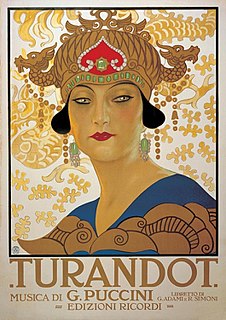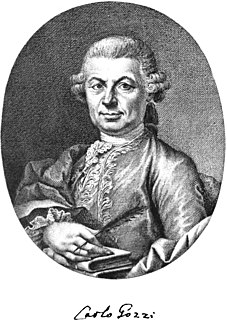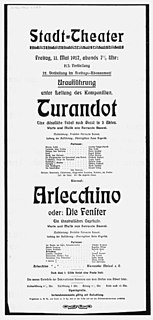See also
- 530 Turandot, a minor planet named for Puccini's character
- The Curse of Turandot , 2021 film, loosely based on Gozzi's play
- Princess Turandot (film), 1934 German comedy film
- Princess Turandot, a play written in 2000 by Darko Tresnjak
Turandot is a 1926 opera by Giacomo Puccini.
Other works of that title include:

Turandot is an opera in three acts by Giacomo Puccini, posthumously completed by Franco Alfano in 1926, and set to a libretto in Italian by Giuseppe Adami and Renato Simoni. Its best-known aria is "Nessun dorma".

Ferruccio Busoni was an Italian composer, pianist, conductor, editor, writer, and teacher. His international career and reputation led him to work closely with many of the leading musicians, artists and literary figures of his time, and he was a sought-after keyboard instructor and a teacher of composition.

Carlo, Count Gozzi was a Venetian playwright and champion of Commedia dell'arte.

Franco Alfano was an Italian composer and pianist, best known today for his opera Risurrezione (1904) and for having completed Puccini's opera Turandot in 1926. He had considerable success with several of his own works during his lifetime.
Doctor Faustus may refer to:
"Nessun dorma" is an aria from the final act of Giacomo Puccini's opera Turandot and one of the best-known tenor arias in all opera. It is sung by Calaf, il principe ignoto, who falls in love at first sight with the beautiful but cold Princess Turandot. Any man who wishes to wed Turandot must first answer her three riddles; if he fails, he will be beheaded. In the aria, Calaf expresses his triumphant assurance that he will win the princess.
"In questa reggia" is an aria from Giacomo Puccini's opera Turandot set to a libretto in Italian by Giuseppe Adami and Renato Simoni. The text is based on Friedrich Schiller's adaptation of the play Turandot by Carlo Gozzi. The aria takes place in scene two of the second act, and is sung mostly by the Princess Turandot (soprano), but with a reply from Calaf (tenor), which is a key point of the opera.
Turandot is a minor planet orbiting the Sun that was discovered by German astronomer Max Wolf on 11 April 1904 and named for the title character in a play by Carlo Gozzi that was to become best known as an opera Turandot by Puccini.

Turandot (1762) is a commedia dell'arte play by Count Carlo Gozzi after a supposedly Persian story from the collection Les Mille et un jours (1710–1712) by François Pétis de la Croix. Gozzi's Turandot was first performed at the Teatro San Samuele, Venice, on 22 January 1762.

Arlecchino, oder Die Fenster is a one-act opera with spoken dialog by Ferruccio Busoni, with a libretto in German, composed in 1913. He completed the music for the opera while living in Zurich in 1916. It is a number opera written in neo-classical style and includes ironic allusions to operatic conventions and situations typical of the late 18th and early 19th centuries. It even includes a parody of a duel.
Turandot or the Whitewashers' Congress is an epic comedy by the German modernist playwright Bertolt Brecht. It was written during the summer of 1953 in Buckow and substantially revised in light of a brief period of rehearsals in 1954, though it was still incomplete at the time of Brecht's death in 1956 and did not receive its first production until several years later. It premièred on 5 February 1969 at the Zürich Schauspielhaus, in a production directed by Benno Besson and Horst Sagert, with music by Yehoshua Lakner.

Turandot(BV 273) is a 1917 opera with spoken dialogue and in two acts by Ferruccio Busoni. Busoni prepared his own libretto, in German, based on the play by Count Carlo Gozzi. The music for Busoni's opera is based on the incidental music, and the associated Turandot Suite, which Busoni had written in 1905 for a production of Gozzi's play. The opera is often performed as part of a double bill with Busoni's earlier one-act opera Arlecchino.

Tartaglia is a dainty character in the Commedia dell'arte. He is farsighted and with a minor stutter, he is usually classed as one of the group of old characters (vecchio) who appears in many scenarios as one of the lovers (innamorati). His social status varies; he is sometimes a bailiff, lawyer, notary or chemist. Dramatist Carlo Gozzi turned him into a statesman, and so he remained thereafter. Tartaglia wears a large felt hat, an enormous cloak, oversized boots, a long sword, a giant moustache and a cardboard nose. He usually represents the lower working class but at times the middle or upper class in the commedia dell'arte.

Ferruccio Busoni discography chronicles the list of releases by the music artist.

Elegies, BV 249, by the Italian composer Ferruccio Busoni is a set of solo piano pieces which can be played as a cycle or separately. Initially published in 1908 with six pieces, it was subsequently expanded to seven by the addition of the Berceuse. The set of seven takes just over 40 minutes to play.

The Turandot Suite, Op. 41 is an orchestral work by Ferruccio Busoni written in 1904-5, based on Count Carlo Gozzi's play Turandot. The music – in one form or another – occupied Busoni at various times between the years 1904–17. Busoni arranged the suite from incidental music which he was composing to accompany a production of Gozzi's play. The suite was first performed on 21 October 1905, while the play with his incidental music was not produced until 1911. In August 1916 Busoni had finished composing the one-act opera Arlecchino, but it needed a companion work to provide a full evening's entertainment. He suddenly decided to transform the Turandot music into a two-act opera with spoken dialog. The two works were premiered together as a double-bill in May 1917.
Turandot at the Forbidden City was a 1998 live production of Giacomo Puccini's opera Turandot directed by Zhang Yimou.

Princess Turandot is a 1934 German comedy film directed by Gerhard Lamprecht and starring Käthe von Nagy and Willy Fritsch. A separate French-language version Turandot, Princess of China was also released.
Jethro Bithell was a collier's son, born at Birchall Farm, Hindley, near Wigan. He graduated with first-class honours in Modern Languages from Owens College, Manchester, in 1900. After gaining his M.A. there, he continued his studies in Munich and Copenhagen and then returned to Manchester as Lecturer in German. In 1910 he was appointed Head of the German Depertment at Birkbeck College, London, where he remained until his retirement in 1938.